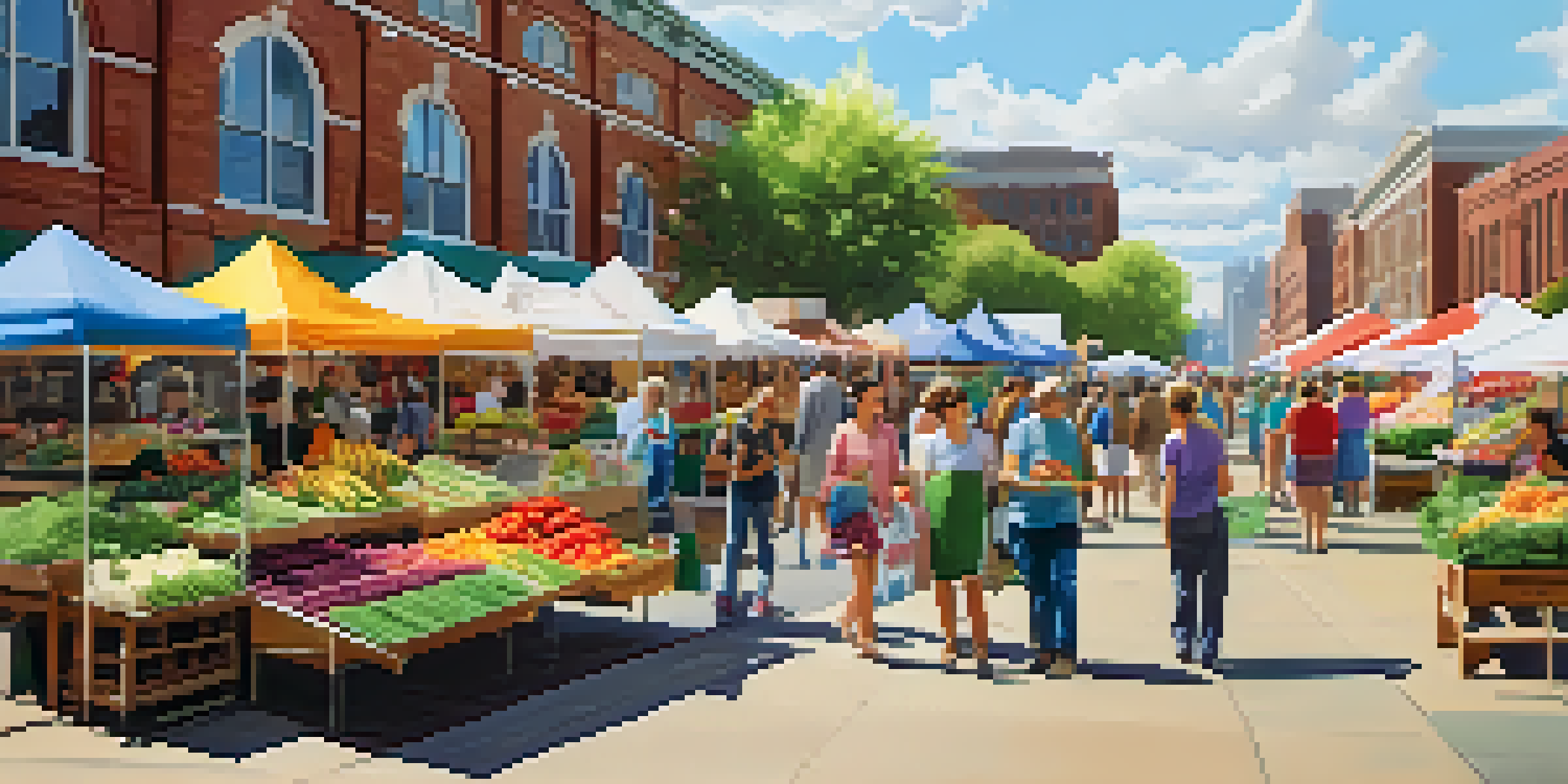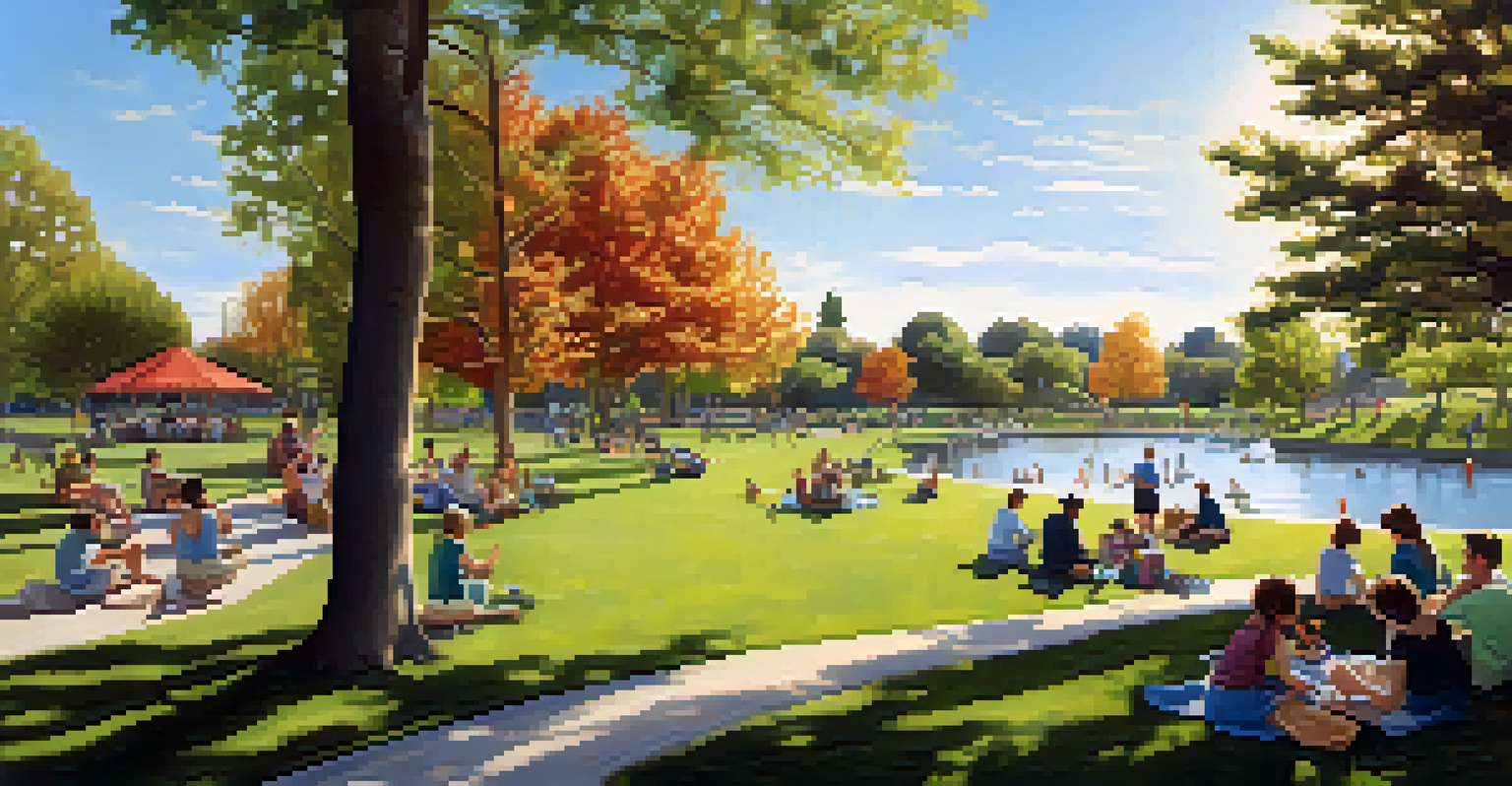Urban Living: The Importance of Local Community

Why Local Community Matters in Urban Living
In urban environments, local communities play a crucial role in shaping our day-to-day lives. They provide a sense of belonging and connection that can often feel lost in the hustle and bustle of city life. When people engage with their local community, they foster relationships that can lead to a more fulfilling and enriched lifestyle.
Alone we can do so little; together we can do so much.
Additionally, local communities often serve as a support system during challenging times. Whether it’s a neighbor lending a hand or a local group organizing resources, these connections are vital. Urban living can be isolating, but a strong community network makes it easier to navigate life's ups and downs together.
Moreover, community involvement can lead to collective action for positive change. When residents come together to address local issues, such as safety or environmental concerns, they create a more vibrant and livable urban space. After all, a united community is more effective in advocating for its members' needs.
Building Relationships: The Heart of Community Engagement
At the core of any thriving local community is the relationships formed between its members. Engaging with neighbors through social events, volunteer opportunities, or casual meet-ups fosters trust and camaraderie. These interactions often blossom into friendships that enhance the overall quality of urban living.

For instance, participating in local farmers' markets not only supports local businesses but also encourages conversations between community members. Sharing stories and experiences in these casual settings can lead to deeper connections. It’s these seemingly small interactions that help build a strong community foundation.
Community Builds Connection and Support
Local communities foster relationships that provide emotional support and a sense of belonging in urban environments.
Furthermore, strong relationships within a community can lead to collaborative projects that benefit everyone. Whether it’s a community garden or a neighborhood watch program, working together cultivates a sense of ownership and pride. In essence, investing time in building relationships pays dividends in the form of a more cohesive urban environment.
The Role of Local Businesses in Community Health
Local businesses are the lifeblood of urban communities, offering unique products and services while fostering local culture. When residents choose to shop locally, they strengthen the community’s economy and create jobs. This economic support helps small businesses thrive, which in turn enhances the overall vibrancy of urban life.
The greatness of a community is most accurately measured by the compassionate actions of its members.
Moreover, local businesses often contribute to community identity. Think about your favorite coffee shop or bookstore—these spaces become gathering points where people connect. They host events, provide a platform for local artists, and contribute to the unique character of the neighborhood.
By supporting local businesses, residents also invest in the community’s future. Many small businesses engage in philanthropic efforts, sponsoring local events or supporting schools. This reciprocal relationship strengthens community ties and ensures that the urban environment remains dynamic and inclusive.
Creating a Sense of Belonging through Community Events
Community events are essential for fostering a sense of belonging among urban residents. From street fairs to cultural festivals, these occasions bring people together, creating shared experiences that strengthen community bonds. They provide an opportunity for individuals to engage with one another and celebrate their diverse backgrounds.
Participating in local events can also help residents discover new interests and talents. Whether it’s a cooking class or a neighborhood cleanup, these activities encourage skill-sharing and collaboration. This not only enriches individual lives but also enhances the community's overall resilience.
Events Enhance Community Engagement
Participating in community events creates shared experiences that strengthen bonds and promote inclusivity among residents.
Furthermore, community events often serve as a platform for local voices to be heard. They provide a space for discussions about important issues, enabling residents to express their thoughts and concerns. When communities come together for a common cause, it cultivates a greater sense of unity and purpose.
The Impact of Community Spaces on Urban Living
Community spaces, such as parks and recreational centers, play an important role in urban living by providing areas for relaxation and socialization. These spaces offer a respite from the fast-paced urban life, allowing residents to unwind and connect with nature. Access to green spaces has been shown to improve mental health and overall well-being.
Additionally, community spaces can act as hubs for organized activities and programs. From sports leagues to art classes, these venues provide opportunities for residents to engage in healthy, fulfilling pursuits. This not only promotes physical health but also encourages social interaction.
Moreover, well-designed community spaces can enhance the aesthetic appeal of urban areas. They create inviting environments that encourage people to spend time outdoors and interact with their neighbors. Such spaces contribute to a sense of pride in the community, making urban living more enjoyable for everyone.
Strengthening Community Through Volunteerism
Volunteering is a powerful way to strengthen community ties and contribute to the greater good. When individuals dedicate their time and skills to local causes, they not only help those in need but also build connections with fellow volunteers. This shared commitment to service fosters a sense of unity and purpose among community members.
For example, participating in a local food bank or environmental cleanup can lead to friendships based on shared values and experiences. Volunteers often find that their efforts create a ripple effect, inspiring others to get involved and strengthen the community even further. It’s a beautiful cycle of giving back and receiving support.
Local Businesses Boost Community Health
Supporting local businesses not only enhances the economy but also contributes to the unique identity and vibrancy of urban life.
In addition, volunteerism can enhance community resilience. When residents are actively engaged in addressing local issues, they cultivate a sense of ownership and responsibility. This proactive approach can lead to innovative solutions and a more sustainable urban environment, ultimately benefiting everyone.
Navigating Challenges: Community as a Support System
Urban living comes with its fair share of challenges, from high living costs to social isolation. However, a strong local community can serve as a vital support system during tough times. When neighbors come together to share resources, information, and emotional support, they can help each other navigate life's hurdles more effectively.
For instance, during a crisis, such as a natural disaster or economic downturn, communities that are tightly knit often respond more quickly and effectively. Whether it's organizing food drives or providing temporary shelter, the collective effort of local residents can make a significant difference. This sense of solidarity helps individuals feel less alone in their struggles.

Moreover, addressing mental health challenges is easier within a supportive community. When individuals know they have a network to rely on, they are more likely to seek help and share their experiences. This open dialogue reduces stigma and fosters a culture of support, making urban living more manageable for everyone.